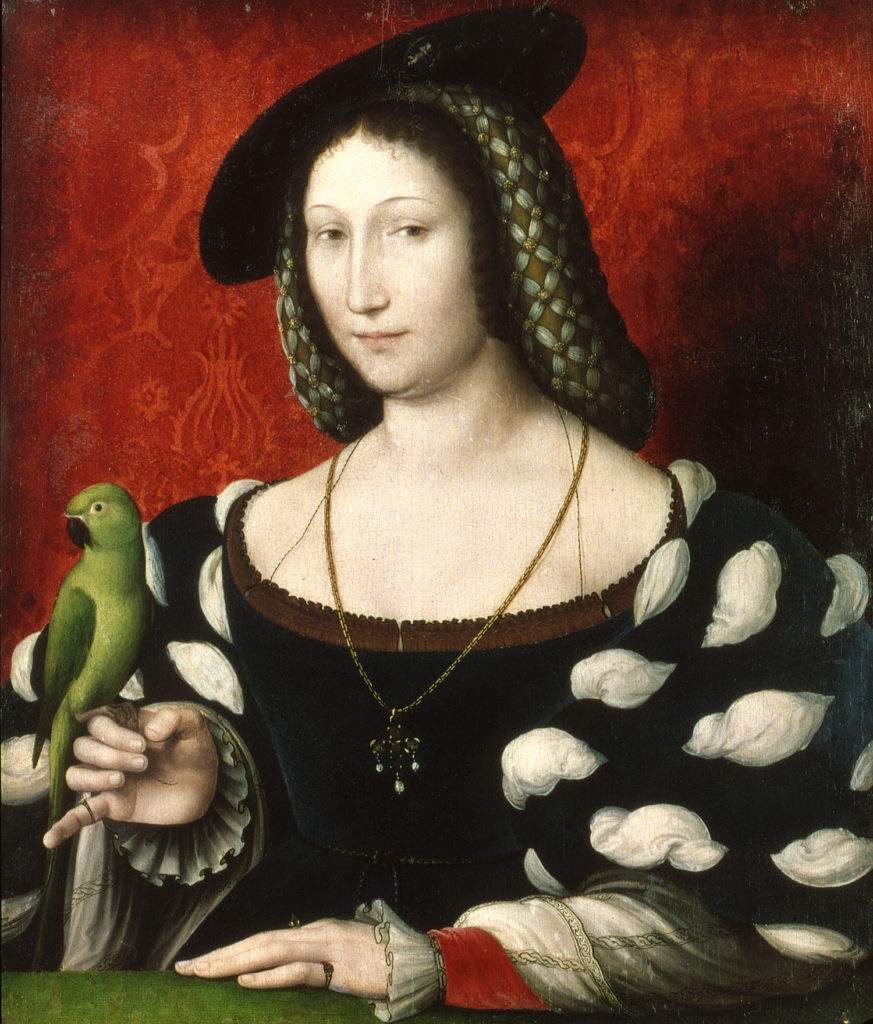
The Spiritual Advisor (1516)
In 1516, King François’s older sister, Marguerite, is 24 and in an unhappy, childless marriage, arranged by her father, to Charles, the duc d’Alençon, who owns a large part of Normandy. Marguerite is well educated and well-read (but not yet the renowned literary figure that she will become), so it is understandable that she had cried throughout her wedding service as her husband is illiterate and primarily concerned with hunting. In contrast, Marguerite has books imported to her new home at the castle in Alençon, and also invites musicians, poets and scholars to a regular salon which becomes known as ‘The New Parnassus’ after the mountain in Greek Mythology which, as the home of the Muses, was the inspiration for all poetry, music, and learning.
For a young woman of royal blood, she has an unusual sense of social justice that contrasts with the entitlement of most of her peers. She looks at, rather than through, the ordinary people of Alençon and notices how many are poor and begging, or are old and infirm. She makes it her duty to visit the convents, hospices and almhouses, and sees the unmarried pregnant women and abandoned children. She listens to the stories of violence, rape and infanticide. She recoils hearing how certain types of men, some of them priests and monks, abuse their positions of power. Then she decides that she can do something about this, at least in the lands her husband controls. She starts collecting funds from the noblewomen of her court to give to charity, but being of a reflective nature, she soon realises that real improvements require reform, so she focuses on how hygiene can be improved to stop disease spreading, and how healthier meals can be provided to reduce infant mortality. So that all this is not a ‘once and forgotten’ exercise, she establishes a group of observers to oversee the implementation and report back.
Marguerite’s marriage options were first publicised as a child when her mother Louise de Savoie, widowed early after the death of her husband, had written a letter to England offering Marguerite, aged 10, as a bride to Henry Tudor who was a year older. It was not unusual among the ruling classes to be betrothed as young children, as part of political machinations. At that time, Henry had just become heir to the throne of England after his older brother, Arthur Prince of Wales, had died of sweating sickness at his castle on the Welsh Marches after only 5 months of an unconsummated marriage to Katherine of Aragon, who survived the same illness. The offer was politely refused, and Marguerite was spared the opportunity to become Henry VIII’s first wife.
As Marguerite now knew, marriage did not necessarily lead to happiness. Another accepted convention amongst the nobility, and one that she would fight against throughout her life in her actions and writings, was that of male infidelity. She is acutely aware that her mother had been a victim of such ‘traditions’, but also that this experience had made her a formidable woman. Louise was married at 11 to Charles d’ Angoulême who was part of the ruling Valois dynasty, although they only began living together when she was 15, by which time he had an established mistress who was to remain living with them in the household, and who bore him two daughters. He also had third illegitimate daughter with another mistress. Charles fell ill after going out riding one winter and died aged 36, leaving Louise a widow at 19, with Marguerite aged 4 and François aged 2. This state of affairs could have been disastrous for Marguerite had Louise not believed in education for women and, as she matured into her later role as mother of the king and regent, developed a keen political mind. An avid reader herself, she made sure that her children were both brought up familiar with the classics, particularly with the rediscovery of the original writings leading to new thinking in the arts and sciences coming out of Italy, and she encouraged translations into French. She made sure that François learned Spanish and Italian, which may or may not have been a blessing given his future dealings, mostly unfriendly, with those countries. Marguerite grew up with an appreciation of philosophy and poetry.
Read more